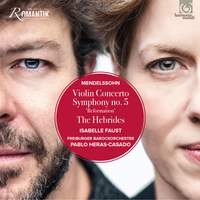Recording of the Week,
Isabelle Faust plays Mendelssohn's Violin Concerto
Isabelle Faust has always had a reputation as one of our most intellectually curious violinists, spending almost as much time immersed in libraries and archives when preparing a work as she does in the practice-room, so it was no surprise to learn that she is fascinated by the impact of early interpreters such as Joseph Joachim, Ferdinand David and Hubert Léonard on Mendelssohn’s ever-green Violin Concerto. Reading through the booklet-notes for this recording, I was intrigued but not surprised to discover that she’d approached it with her usual scholarly vigour, consulting the annotations and editions made by the work’s original ambassadors to get a comprehensive sense of how they might have interpreted the solo part. The real shock came as soon as I pressed Play: Faust’s research infuses the sound-world of the piece from the very first phrase, and I found my expectations being delightfully confounded at every turn.
Her treatment of the plaintive E minor melody at the very beginning showcases two of the main stylistic innovations which result from her mining of the archives: very little vibrato, with the sound warmed instead by liberal but judiciously-applied portamento, which Faust believes to be in keeping with the approach of Joachim, David et al (and which puts into practice some advice I encountered as a student violinist about avoiding the tendency of some modern string-players to view vibrato ‘like deodorant: they panic without it’). The net effect is that the solo line emerges organically from the orchestral texture and shimmers, rather than soars, above it, the sound clean and almost flute-like rather than muscular and intense, and the same is true of the beautiful cantabile slow movement: it’s as if an aria which we’re used to hearing sung by a dramatic soprano is suddenly in the hands of a light lyric voice, and it’s mesmerising.

On first listening, I was acutely aware that the palette of colours on display was radically different from what I’ve grown used to (if I might be allowed one more analogy, it’s an experience akin to seeing a heavily pigmented oil-painting translated into a subtle watercolour), but couldn’t put my finger on how or why. It was only on third or fourth hearing that I realised how much that use of portamento has an effect on timbre as well as aiding expressivity: sliding between pitches often means that Faust takes certain notes and even entire phrases on a different string from ‘usual’, so that there are little flashes of brightness or muted plaintiveness where you least expect them.
Her discovery that early interpreters made far more use of open strings and harmonics than their successors also makes its mark in passagework that sparkles like fragile filigree (particularly in the finale, which put me more in mind of the fairy music from A Midsummer Night’s Dream than ever), and in places alters the whole architecture of a phrase: taken as a harmonic, the climactic high E at the end of the concerto recedes gracefully into the orchestral texture rather than sweeping all before it, but there’s always the sense that the music’s being well-served rather than short-changed by these choices.
Pablo Heras-Casado and the small-but-perfectly-formed Freiburg Baroque Orchestra (just four desks of each violin part, and two of cellos) support her every decision with playing that enables Faust to shine through unimpeded even when she’s at her most delicate and self-effacing, but take the spotlight with gusto in the passages where she drops into the role of accompanist, so that the whole thing really feels like top-notch chamber music rather than a virtuosic battle between orchestra and soloist.
I’ve barely left myself space to discuss the other two works on the recording, the Hebrides Overture and Reformation Symphony, but suffice it to say that their playing here is distinguished by the same clarity, balance and pointed attack which makes the concerto so effective (it also appears that some of Faust’s innovations have carried through to the string-playing here), and that Heras-Casado does an uncommonly fine job of pointing up Mendelssohn’s debt to the great baroque masters as well as his foreshadowing of Wagner: I’ve never noticed the affinity between The Hebrides and The Flying Dutchman, or the outer movements of the Reformation and Parsifal quite so keenly. The disc is released next week - you can pre-order it now, and it will also be available as a Hi-Res download from next Friday. Also, Faust, Heras-Casado and the Freiburgers bring their Mendelssohn to the Proms early next month – do catch their live performance if you can!
Isabelle Faust (violin), Freiburger Barockorchester, Pablo Heras-Casado
Available Formats: CD, MP3, FLAC, Hi-Res FLAC



